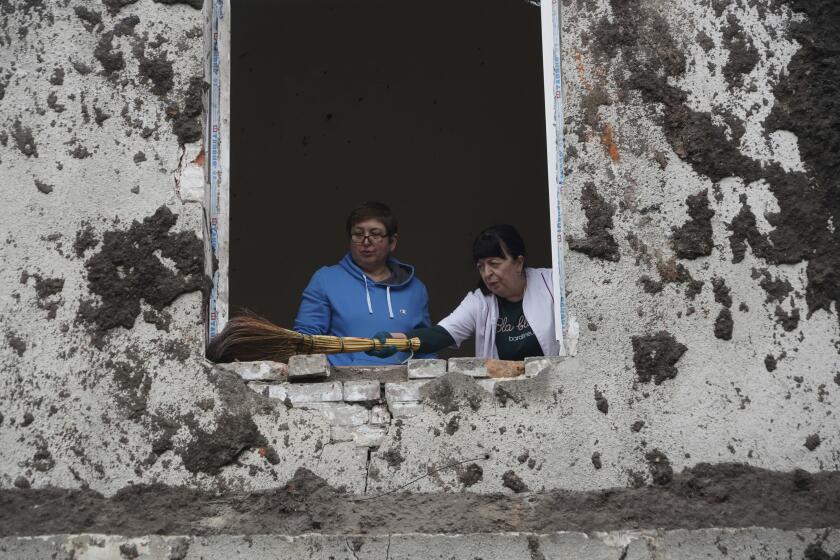Centrist not picking sides in French race
France’s heated presidential race became a battle for the political center Wednesday when Francois Bayrou, whose strong finish in Sunday’s first-round vote made him a potential kingmaker, refused to endorse a candidate in the runoff.
At a packed news conference, Bayrou declined to formally ally himself with either Nicolas Sarkozy, the candidate of the rightist Union for a Popular Movement, or Segolene Royal of the Socialist Party. However, Bayrou sent signals that he prefers Royal.
During the first-round election, Bayrou finished third with more than 18% of the ballots in a field of 12 candidates, giving him the backing of 6.8 million voters. The centrist said Wednesday that making an endorsement in the May 6 runoff would amount to betraying his reformist campaign against traditional party machines. He said his voters were free to do as they pleased.
“Let’s speak frankly: Nicolas Sarkozy and Segolene Royal, in the perennial confrontation between the perennial right and the perennial left, will neither of them heal any of [France’s] ills,” Bayrou said. “In this situation, I will not recommend a vote.
“On the contrary,” he added, “I want to guarantee to the French that whichever candidate wins, they will find themselves represented by an opposition power, free and capable of saying yes if the [government’s] action is good and no if it is bad.”
Bayrou’s announcement was a much-awaited development in what is shaping up as France’s most significant election in decades, ushering in a new generation of leaders at a time of economic, political and social crisis. So far, the two-week runoff race has combined the speed of a sprint with the ferocity of a boxing match.
Bayrou’s dislike for Sarkozy had been evident on the campaign trail. Although Bayrou criticized both contenders Wednesday, he was harsher on Sarkozy. He accused the conservative candidate of “a taste for intimidation and menace” and said he would “risk aggravating the strains in the social fabric, notably by setting a policy that benefits the richest.” In contrast, he criticized the Socialists’ economic program, but described Royal as “seeming better-intentioned.”
Bayrou told journalists that he had not decided how to vote, but said he might express a preference as the campaign evolves.
Bayrou also accepted an invitation that Royal had made two days earlier to hold a public debate with him about the future of France. And Bayrou announced that he would scuttle the party he now leads, the Union for French Democracy, and create a new Democrat Party whose ideology would resemble that of British Prime Minister Tony Blair’s Labor Party and the Democrats in the United States. The move would end the longtime center-right alliance between Bayrou’s old party and Sarkozy’s UMP.
The Bayrou vote is the key to victory for Sarkozy or Royal. Bayrou said he thought his supporters would divide about evenly between the two camps. Various pundits predict different breakdowns, most of them favorable to Sarkozy, who holds a narrowing lead in the polls.
Many longtime Bayrou partisans are centrist Roman Catholics. In addition, many of his current party’s 29 legislative deputies were elected in center-right alliances with the UMP and fear political retaliation if they do not support Sarkozy.
“The divisions in the Bayrou vote are pretty balanced,” said Stephane Zumsteeg of the Ipsos polling firm, though he said longtime supporters were generally “centrists, Christian Democrat-style voters who have always voted for the right.”
The latest Ipsos poll shows 39% of Bayrou voters supporting Royal in the runoff, 32% backing Sarkozy and 29% undecided or abstaining. But the poll also has Sarkozy beating Royal in the runoff with 53% of the vote, suggesting he does not need a majority of the centrist bloc to win, Zumsteeg said.
On the other hand, a poll in Le Figaro newspaper Wednesday had Royal rising to 49% of the total vote compared with Sarkozy’s 51%, the closest margin to date.
After Bayrou’s speech, Royal quickly offered to hold their televised debate, or “dialogue,” on Friday.
“The sole objective is to enlighten the voters, to give dignity to the debate, to clarify the solutions that will permit France to advance ... and not to convince Francois Bayrou,” Royal said. She had earlier said she would appoint Cabinet ministers loyal to Bayrou if he supported her.
Analysts say Royal has decided the voting numbers all but force her to reach out to Bayrou and the center, though, Zumsteeg said, she runs the risk of losing voters from small, far-left parties that accounted for almost 10% of the ballots Sunday.
“In the hunt for the center, if she does too much she could lose the left,” he said.
Sarkozy, who is known for his hard-nosed rhetoric, has ruled out an alliance with Bayrou, though aides say he would appoint some centrist ministers. Sarkozy said Wednesday night that he was willing to have a public discussion, but not a debate, with Bayrou.
At a rally in Dijon on Monday, Sarkozy appeared with a former Royal advisor, Eric Besson, who recently changed sides. Besson told the audience that he took part in strategy meetings in which the Socialists decided the only way to beat Sarkozy was to demonize him.
When Sarkozy took the stage, he set a softer tone that suggested he would try in the runoff to portray himself as a unifying force. His speech was punctuated with a rhetorical refrain for ardent critics who he says have no program other than attacking him: “Why all the hate?”
More to Read
Start your day right
Sign up for Essential California for news, features and recommendations from the L.A. Times and beyond in your inbox six days a week.
You may occasionally receive promotional content from the Los Angeles Times.






